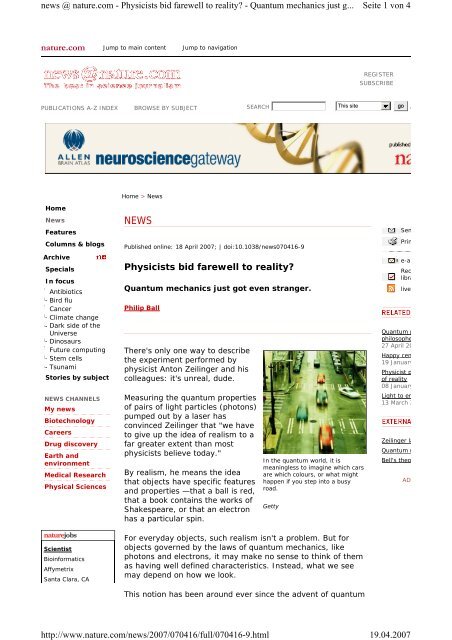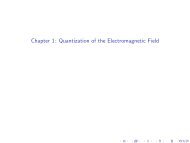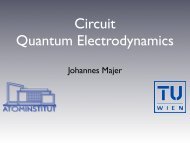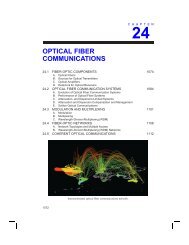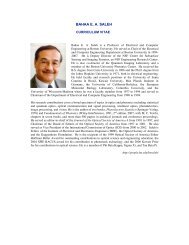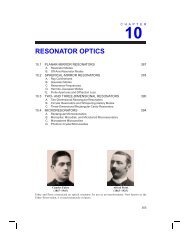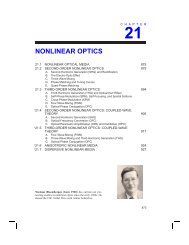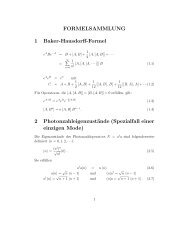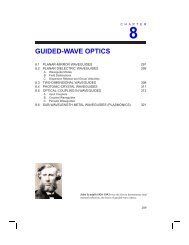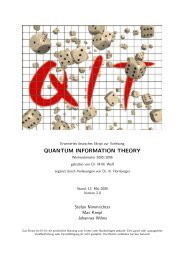nature.com Physicists bid farewell to reality? Seite 1 von 4 ... - CoQuS
nature.com Physicists bid farewell to reality? Seite 1 von 4 ... - CoQuS
nature.com Physicists bid farewell to reality? Seite 1 von 4 ... - CoQuS
Create successful ePaper yourself
Turn your PDF publications into a flip-book with our unique Google optimized e-Paper software.
news @ <strong>nature</strong>.<strong>com</strong> - <strong>Physicists</strong> <strong>bid</strong> <strong>farewell</strong> <strong>to</strong> <strong>reality</strong>? - Quantum mechanics just g...<br />
http://www.<strong>nature</strong>.<strong>com</strong>/news/2007/070416/full/070416-9.html<br />
<strong>Seite</strong> 1 <strong>von</strong> 4<br />
19.04.2007<br />
<strong>nature</strong>.<strong>com</strong> Jump <strong>to</strong> main content Jump <strong>to</strong> navigation<br />
REGISTER<br />
SUBSCRIBE<br />
PUBLICATIONS A-Z INDEX BROWSE BY SUBJECT<br />
SEARCH<br />
This site<br />
go<br />
A<br />
Home > News<br />
Home<br />
News<br />
Features<br />
Columns & blogs<br />
Archive<br />
Specials<br />
In focus<br />
Antibiotics<br />
Bird flu<br />
Cancer<br />
Climate change<br />
Dark side of the<br />
Universe<br />
Dinosaurs<br />
Future <strong>com</strong>puting<br />
Stem cells<br />
Tsunami<br />
S<strong>to</strong>ries by subject<br />
NEWS CHANNELS<br />
My news<br />
Biotechnology<br />
Careers<br />
Drug discovery<br />
Earth and<br />
environment<br />
Medical Research<br />
Physical Sciences<br />
<strong>nature</strong>jobs<br />
Scientist<br />
Bioinformatics<br />
Affymetrix<br />
Santa Clara, CA<br />
NEWS<br />
Published online: 18 April 2007; | doi:10.1038/news070416-9<br />
<strong>Physicists</strong> <strong>bid</strong> <strong>farewell</strong> <strong>to</strong> <strong>reality</strong>?<br />
Quantum mechanics just got even stranger.<br />
Philip Ball<br />
There's only one way <strong>to</strong> describe<br />
the experiment performed by<br />
physicist An<strong>to</strong>n Zeilinger and his<br />
colleagues: it's unreal, dude.<br />
Measuring the quantum properties<br />
of pairs of light particles (pho<strong>to</strong>ns)<br />
pumped out by a laser has<br />
convinced Zeilinger that "we have<br />
<strong>to</strong> give up the idea of realism <strong>to</strong> a<br />
far greater extent than most<br />
physicists believe <strong>to</strong>day."<br />
By realism, he means the idea<br />
that objects have specific features<br />
and properties —that a ball is red,<br />
that a book contains the works of<br />
Shakespeare, or that an electron<br />
has a particular spin.<br />
In the quantum world, it is<br />
meaningless <strong>to</strong> imagine which cars<br />
are which colours, or what might<br />
happen if you step in<strong>to</strong> a busy<br />
road.<br />
Getty<br />
For everyday objects, such realism isn't a problem. But for<br />
objects governed by the laws of quantum mechanics, like<br />
pho<strong>to</strong>ns and electrons, it may make no sense <strong>to</strong> think of them<br />
as having well defined characteristics. Instead, what we see<br />
may depend on how we look.<br />
This notion has been around ever since the advent of quantum<br />
Sen<br />
Prin<br />
e-a<br />
Rec<br />
libra<br />
live<br />
Quantum p<br />
philosophe<br />
27 April 20<br />
Happy cen<br />
19 January<br />
Physicist p<br />
of <strong>reality</strong><br />
08 January<br />
Light <strong>to</strong> en<br />
13 March 2<br />
Zeilinger la<br />
Quantum n<br />
Bell's theo<br />
AD
news @ <strong>nature</strong>.<strong>com</strong> - <strong>Physicists</strong> <strong>bid</strong> <strong>farewell</strong> <strong>to</strong> <strong>reality</strong>? - Quantum mechanics just g...<br />
http://www.<strong>nature</strong>.<strong>com</strong>/news/2007/070416/full/070416-9.html<br />
<strong>Seite</strong> 2 <strong>von</strong> 4<br />
19.04.2007<br />
Assistant / Associate<br />
Professor<br />
Education<br />
NVCI<br />
Las Vegas, NV<br />
More science jobs<br />
Feedback<br />
About this site<br />
About us<br />
For librarians<br />
TOP STORIES<br />
<strong>Physicists</strong> <strong>bid</strong> <strong>farewell</strong> <strong>to</strong><br />
<strong>reality</strong>?<br />
18 April 2007<br />
Full fossil found for the<br />
earliest trees<br />
18 April 2007<br />
Orangutans have it easy<br />
18 April 2007<br />
Changes <strong>to</strong> pesticide<br />
spraying could reduce<br />
GM harm<br />
18 April 2007<br />
Should kids take<br />
antidepressants?<br />
17 April 2007<br />
Decades needed <strong>to</strong> tell<br />
whether ocean currents<br />
are slowing<br />
17 April 2007<br />
Tales of the expected<br />
17 April 2007<br />
Dark matter looks <strong>to</strong> be<br />
particularly wimpy<br />
17 April 2007<br />
mechanics in the early twentieth century. The theory seemed <strong>to</strong><br />
show that, in the quantum world, objects are defined only<br />
fuzzily, so that all we can do is work out the probability that<br />
they have particular characteristics — such as being located in a<br />
specific place or having a specific energy.<br />
Allied <strong>to</strong> this assault on <strong>reality</strong> was the apparent prediction of<br />
what Albert Einstein, one of the chief architects of quantum<br />
theory, called 'spooky action at a distance'. Quantum theory<br />
suggests that disturbing one particle can instantaneously<br />
determine the properties of a particle with which it is<br />
'entangled', no matter how far away it is. This would violate the<br />
usual rule of locality: that local behaviour is governed by local<br />
events.<br />
We have a little more<br />
evidence that the world<br />
is really strange.<br />
An<strong>to</strong>n Zeilinger<br />
University of Vienna<br />
Failed test<br />
Einstein could not believe that the<br />
world was really so indeterminate.<br />
He supposed that a deeper level of<br />
<strong>reality</strong> had yet <strong>to</strong> be uncovered —<br />
so-called 'hidden variables' that<br />
specified an object's properties<br />
precisely and in strictly local terms.<br />
In the 1960s the Irish physicist John Bell showed how <strong>to</strong> put<br />
locality and realism <strong>to</strong> the test. He deduced that if both ideas<br />
applied <strong>to</strong> the quantum world, then two particular quantities<br />
calculated from measurements made on a pair of entangled<br />
pho<strong>to</strong>ns would be equal <strong>to</strong> one another. If so, there would be<br />
nothing 'spooky' about entanglement after all.<br />
Experiments were done <strong>to</strong> test his prediction in the ensuing two<br />
decades, and results showed that Bell's equality was violated.<br />
Thus, either realism or locality, or possibly both of these ideas,<br />
do not apply in the quantum world.<br />
But which is it? That's what Zeilinger, based at the University of<br />
Vienna in Austria, and his colleagues tried <strong>to</strong> find out.<br />
They came up with a similar test <strong>to</strong> Bell's, <strong>to</strong> see whether<br />
quantum mechanics obeys realism but not locality. Again the<br />
experiment involves <strong>com</strong>paring two quantities calculated from<br />
measurements on entangled pho<strong>to</strong>ns, <strong>to</strong> see if they are equal.<br />
But whereas in Bell's test these quantities are derived from the<br />
so-called 'linear' polarization of the pho<strong>to</strong>ns — crudely, whether<br />
their electromagnetic fields oscillate in one direction or the<br />
other — Zeilinger's experiment looks at a different sort of<br />
polarization, called elliptical polarization.<br />
Like Bell's, Zeilinger's equality proved false. This doesn't rule<br />
out all possible non-local realistic models, but it does exclude an<br />
important subset of them. Specifically, it shows that if you have<br />
a group of pho<strong>to</strong>ns that all have independent polarizations, then<br />
you can't ascribe specific polarizations <strong>to</strong> each. It's rather like<br />
saying that you know there are particular numbers of blue,<br />
white and silver cars in a car park — but it is meaningless even<br />
<strong>to</strong> imagine saying which ones are which.<br />
Soil May<br />
Buckybal<br />
100-Year<br />
Climate Z<br />
Never Se<br />
Beyond IQ<br />
Can Focu<br />
Hand Do<br />
Battling B<br />
Protein<br />
more sc
news @ <strong>nature</strong>.<strong>com</strong> - <strong>Physicists</strong> <strong>bid</strong> <strong>farewell</strong> <strong>to</strong> <strong>reality</strong>? - Quantum mechanics just g...<br />
http://www.<strong>nature</strong>.<strong>com</strong>/news/2007/070416/full/070416-9.html<br />
<strong>Seite</strong> 3 <strong>von</strong> 4<br />
19.04.2007<br />
Truly weird<br />
If the quantum<br />
ADVERTISEMENT<br />
world is not<br />
realistic in this<br />
sense, then how<br />
does it behave?<br />
Zeilinger says<br />
that some of the<br />
alternative nonrealist<br />
possibilities are<br />
truly weird. For<br />
example, it may<br />
make no sense<br />
<strong>to</strong> imagine what<br />
would happen if<br />
we had made a<br />
different<br />
measurement<br />
from the one we chose <strong>to</strong> make. "We do this all the time in daily<br />
life," says Zeilinger — for example, imagining what would have<br />
happened if you had tried <strong>to</strong> cross the road when a truck was<br />
<strong>com</strong>ing. If the world around us behaved in the same way as a<br />
quantum system, then it would be meaningless even <strong>to</strong> imagine<br />
that alternative situation, because there would be no way of<br />
defining what you mean by the road, the truck, or even you.<br />
Another possibility is that in a non-realistic quantum world<br />
present actions can affect the past, as though choosing <strong>to</strong> read<br />
a letter or not could determine what it says.<br />
Zeilinger hopes that his work will stimulate others <strong>to</strong> test such<br />
possibilities. "Our paper is not the end of the road," he says.<br />
"But we have a little more evidence that the world is really<br />
strange."<br />
Visit our newsblog <strong>to</strong> read and post <strong>com</strong>ments about this<br />
s<strong>to</strong>ry.<br />
Top<br />
References<br />
1. Gröblacher S, et al. Nature, 446. 871 - 875<br />
(2007). | Article |<br />
Top<br />
For full access <strong>to</strong> the site and the archive,<br />
subscribe here:<br />
To receive all the daily news in your inbox<br />
each week, sign up for our email alert here:<br />
To see the latest news visit our homepage:<br />
Top
news @ <strong>nature</strong>.<strong>com</strong> - <strong>Physicists</strong> <strong>bid</strong> <strong>farewell</strong> <strong>to</strong> <strong>reality</strong>? - Quantum mechanics just g...<br />
http://www.<strong>nature</strong>.<strong>com</strong>/news/2007/070416/full/070416-9.html<br />
<strong>Seite</strong> 4 <strong>von</strong> 4<br />
19.04.2007<br />
ISSN: 1744-7933<br />
Home | News | Features | Columns and blogs | Archive news | Specials | In focus | S<strong>to</strong>ries b<br />
My news | Biotechnology news | Careers news | Drug discovery news | Earth and environm<br />
Research news | Physical sciences news |<br />
Feedback | About this site | About us | For librarians | Help<br />
©2007 Nature Publishing Group | Privacy policy


